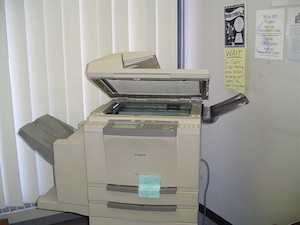 In the previous post, we explored what duplicate content is and how it can negatively affect your solar property.
In the previous post, we explored what duplicate content is and how it can negatively affect your solar property.
In this post, we’ll look at a few copywriting tips to help you avoid duplicate content and its potential penalties. The following list focuses just on the writing itself and not on redirects, meta data, canonical tags, and things of that nature. In a future post, I hope to tackle these more technical areas.
1. Make Your Content Your Own
This one is pretty straightforward. The “copy” in “copywriting” doesn’t refer to stealing or imitating the work of others. It refers to the phrasing and wording of the materials you produce.
So quite simply – don’t steal content to begin with.
Make sure that everything you write is unique and original. If you come across a great idea or amazing passage, try to rewrite the information in your own words.
Admittedly, there are times when someone else has captured an idea so succinctly that you can’t really rewrite it. Other times, you might lift a few sentences because the original writer is an authority and you want to leverage his or her prestige in your own work.
If you ever have to borrow someone else’s wording (like I did when referring to Google’s definition of “duplicate content” in the previous post), make sure you use proper citations. I recommend quotes and a hyperlink to avoid any semblance of “copying.”
2. Expanding or Condensing Pages on Your Own Site
You sell 2 solar panels manufactured by the same company. They have very similar product specs and details – in fact – the wording is almost exactly the same.
Unfortunately, if you publish both product pages on your site, you’re posting duplicate content.
What do you do?
You could combine the product descriptions into 1 main page. And then have a hyperlink for Panel A and a hyperlink for Panel B. Anyone who clicks on either hyperlink will only read content that is truly unique to that panel.
Alternatively, you could rewrite all of the content for one of the panels so that the information is the same but the wording is different.
3. Replace Boilerplates with Hyperlinks
Many of the pages on your solar site might repeat the same few paragraphs at the end or beginning. Perhaps you have a boilerplate “disclaimer” or “about the author” or partial “privacy policy” that you include in the footer again and again.
I’ve seen a lot of sites that do this. On the surface it makes perfect sense – you want to keep your visitors in the loop at all times. And sometimes you may have a legal obligation to publish information repeatedly.
Unfortunately, this is still deemed “duplicate content.”
Rather than include the full text each time, consider publishing this content on its own unique page and including a hyperlink to it whenever necessary. So whenever you publish a new page and want to alert people to your disclaimer, just insert a hyperlink that says, “Click here to read disclaimer.”
4. Syndicating Content – Stealing from Yourself?
As already mentioned, when you syndicate your content, you run the risk of having another site rank higher for the content you originally wrote.
It happens. It happens a lot.
But you can take a couple of steps to minimize the chances of ranking lower than other versions of your own content.
- Publish your version first and wait a day or two before publishing your article elsewhere. Google doesn’t always give credit to the “original” version, but by publishing first, you decrease your chances of being accused of duplicate content.
- Always include a backlink to the original source. For example, you might write, “Originally published on Name of Your Site.” The link points back to your original version. Not only is this great for SEO, but it also tells search engines that “your” site is most likely the original site. This is especially true if you syndicate to tons of sites, all of which refer back to your own version of the post or article.
- It’s also a good idea to include backlinks to other portions of your site, like the homepage or landing pages. You should be using internal links anyway whenever you write a blog or article. Just make sure those links remain active when you publish your pieces elsewhere.
- Enable comments on blog posts whenever possible. The more people who provide feedback, the more unique and valuable your version becomes. Google will be less likely to attribute credit to some other site.
You Can’t Always Win. But You Should Always Play by the Rules
Unfortunately, you can’t really stop other people from stealing your content. There are ways to report content theft, but they’re time-consuming and ultimately not worth it.
Every now and then another site may rank higher for your own work. This can be infuriating. Believe me – I know. But in the long run, regularly updated content that is unique, valuable, and original will ensure that your overall solar SEO strategy succeeds.